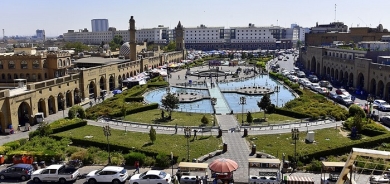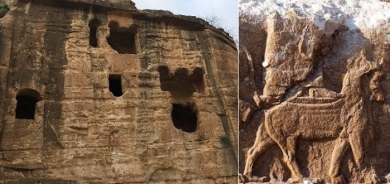Turkey plans conference on Syria, says Assad dares not to use ‘Kurds as a card’

“We are determined to establish a broad-based forum to promote international understanding with all countries concerned” with the developments in Syria, Ahmet Davutoglu said in a televised interview.
The planned conference follows on from a series of conferences hosted by Turkey in 2011 to unite various opposition groups into an established coalition opposition movement.
Davutoglu, who said that the Assad regime dares not to use Kurdish separatist groups as proxies and as a “card” against Turkey, added that Turkey’s prime minister, Tayyip Erdogan, would discuss the situation in Syria in a phone call with Russia’s Dmitry Medvedev later on Wednesday.
The conference could take place in Turkey or in another country but it must certainly be “in the region” and “as soon as possible,” he added.
Turkey has been trying to create a “new roadmap,” on Syria.
Later in the day, Davutoglu will fly to the United States for a meeting with U.S. Secretary of State Hillary Clinton for further discussions on the Syrian crisis.
He will also meet U.S. National Security Advisor Thomas Danilon and return to Turkey on Sunday, said a statement from the foreign ministry.
Erdogan on Tuesday gave initial signs of a new initiative on Syria after China and Russia vetoed a U.N. Security Council resolution backed by the West and the Arab League to stop the months-long bloodshed.
“We will start a new initiative with those countries who stand by the Syrian people, not the regime,” he said, adding that his government would use all diplomatic means to draw the world’s attention to Syria.
The Turkish foreign minister also said that it is “naïve” to believe promises made by Syrian President Bashar al-Assad. On Wednesday, Russia’s foreign minister said that Bashar al-Assad asked his vice president Farouk al-Sharaa to start an integrated dialogue to carry out reforms in Syria.
Turkey, which is increasingly wielding a more of a diplomatic clout in the Syrian crisis, has helped the release of 11 kidnapped Iranian pilgrims heading to Damascus last Wednesday, the foreign minister said.
Syria’s Free Syrian Army has said Turkey mediated the release of the kidnapped Iranians, expressing gratitude to Turkey for its help and support for the rebel army.
Turkey, which has a 910-kilometre border (560 mile) with Syria, has been at the forefront of international criticism against Damascus since an uprising began last March and has become a haven for opposition activists.
U.S. says no to war
The Obama administration said it is not considering invading Syria or arming its rebels to remove president Assad from power.
For now, Washington is relying primarily on what it has been doing for the past 11 months in a so-far unsuccessful bid to force Assad’s government to end its bloody offensive on opponents: sanctions targeting the Syrian regime and isolating it from the world economy.
It is also borrowing somewhat from a strategy used in Libya’s civil war, assembling a group of like-minded nations, led by Arab governments, to coordinate an international strategy against Assad. The goal is to pressure the Syrian leader into accepting an Arab-proposed plan to transfer power to his vice president and allow for a transition to democracy.
“We are working with our partners again to ratchet up the pressure, ratchet up the isolation on Assad and his regime,” White House press secretary Jay Carney said Tuesday. “That pressure is having an impact. Ultimately, it needs to result in Assad ceasing the violence, stopping the brutality and allowing for a transition supported by the Syrian people.”
Yet it’s unclear whether any of the U.S. strategies will produce the optimal result anytime soon.
The diplomatic and military stalemates are prompting some leading voices in Washington to propose more drastic measures to back Syria’s opposition, drawing parallels with America’s support for the Libyan rebels who chased Muammar Qaddafi from power last year.
“We should start considering ... arming the opposition. The bloodletting has got to stop,” Sen. John McCain said. Sending weapons to Syria’s rebels is more difficult than in Libya because they don’t control a base as rebels there did in Benghazi, McCain said, but he insisted it should be done.














